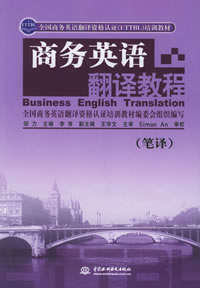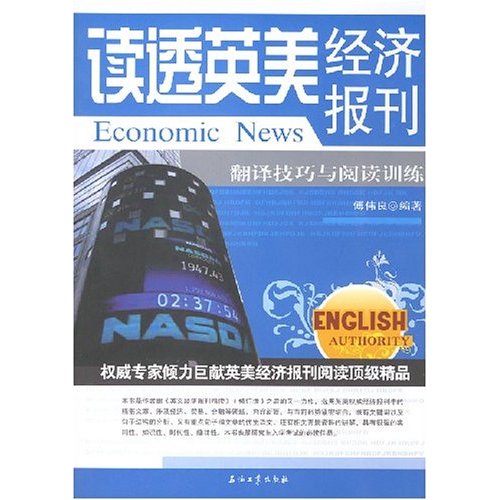Getting Started as a Translator:Gleanings from Honyaku (第二部分)
作者:古龙 2009-07-04




语际翻译公司 转载请注明https://www.scientrans.com
∗本栏目部分文章内容来自互联网,部分已经过本站编辑和整理,如有版权事宜请联系Email/MSN jesczhao@hotmail.com
Secondly, although nearly everyone on this list (including myself) learnt how to translate through on-the-job training, nowadays there is another option available in the form of postgraduate courses in Japanese/English translation (e.g. the courses in Hawaii, Monterey and Brisbane). These are aimed at professional translation (nothing like any translation you may have done in your undergraduate Japanese courses), and they are a shortcut to acquiring some of the knowledge and experience that most of us have taken years to acquire. At the University of Queensland, we are also often able to introduce students to job opportunities that get them started out in the profession. (Apologies for the plug!)
I myself learnt Japanese/English translation in three quite different ways. After formal studies in Japanese I worked in Japan as an in-house translator and then as a freelance translator for about nine years. Then I did a PhD on Japanese-English translation, and this provided a whole new perspective and depth to my practical experience. And now I teach J-E translation, and every day I learn enormously both from my students' problems and from their solutions to their problems.
Judy Wakabayashi
________________________________________
I aquired my language skills through self-study. As in, several hours a day (basically, because I liked it). I spent nearly five years in Japan, the first two as an English conversation instructor.
After two years, I was able to find work as an in-house translator of magazine and newspaper articles about Japanese society, politics, economics, and other subjects of general interest. I was lucky: I applied at several companies for in-house translation jobs, and none of the companies cared as much about experience, academic background, etc., as they did about my ability to apply my alleged skills to their tests. The interview and testing process earned me a demanding and fulfilling job, where I stayed for nearly three years before returning to the United States and embarking on the freelance path.
If pressed to explain how I learned enough Japanese in two years to become a translator, I would say 1) I am visually oriented, and readily took to kanji; and 2) I learned natural sentence patterns, and expanded my vocabulary, by supplementing textbooks with magazines and other material designed for native Japanese readers as soon as I was ready--maybe even before I was ready. I would listen to the radio and watch TV even when I was not yet able to understand one-tenth of what was being said, and in the same fashion I tackled magazines, manga, etc. (I also knew better than to try to force myself to slog through material in which I personally had no interest. Thus I inevitably chose manga or pop magazines over, say, the Nihon Keizai Shimbun.)
I now do work for various agencies and the occasional direct client. It has not been smooth sailing all the way, and it sounds as though some people on the list make more in a month than I make in a year! Then again, the cost of living here is lower, and I have been known to turn down work if it would cut too much into my leisure time. Thus far, I have managed to pay my bills and even put a bit of money away.
Most of my work as a freelancer has been in the area of corporate communications (promotional materials, etc.)--which I really enjoy. I've also translated a health-related book this past year.
In addition to translation, I also do checking and editing work. (Until I went to Japan, editing was my full-time profession.)
Jenny Nazak
________________________________________
I had the good fortune to be able to learn Japanese under the direction of some first-rate literary translators at the University of Michigan, and I remember one telling me that "understanding the Japanese is the easy part; expressing it in English is the hard part."
I've since found that to be true for myself. The limiting factor on my skill as a Japanese-to-English translator is not my Japanese, it's my English.
- 评论
- seme:文章内容文章内容文章内容文章内容文章内容文章内容文章内容文章内容文章内容 章内容文章内容文章内容文章内容文章内容
- seme:文章内容文章内容文章内容文章内容文章内容文章内容文章内容文章内容文章内容 章内容文章内容文章内容文章内容文章内容

- 谈翻译观念的嬗变与翻译技能的训练
2009-6-15 15:33:10 - 《高等学校英语专业英语教学大纲》中规定,大学生通过四年的在校学习,“能运用翻译的理论和技巧,将英美报刊上的文章以及文学原著译成汉语,或将我国报刊、杂志上的文章和一般文学作品译成英语……。译文要求忠实...
- 翻译与网络营销
2009-6-11 0:02:31 - Translation and Your International E-Commerce Strategy Most businesses realize that they ...
期刊征稿
- 第四届IEEE生物信息与生…
2009-6-30 19:42:01 - 基本信息 主办单位: 四川大学,IEEE生物医学工程协会(EMBS) 承办单位 开始日期 2010/06/18 结束日期 截稿日期 2009/1...
- 第九届全国光电技术学术…
2009-6-30 19:35:58 - 基本信息主办单位: 中国宇航学会光电技术专业委员会承办单位 开始日期 2009/11/01结束日期 截稿日期 2009...
















